#is python is easy languages for beginners
Explore tagged Tumblr posts
Text
Python: A Beginner's Best Friend
Python, often praised as the "programming language for everyone," has established itself as a welcoming entry point for beginners venturing into the world of coding. This article delves into why Python is considered easy for beginners and outlines the steps to learn Python development effectively.
Python: A Beginner's Best Friend
Readable and Simple Syntax: Python's primary allure for beginners is its clean and readable syntax. Unlike some programming languages with complex and cryptic code, Python's structure resembles the English language, making it easy for new programmers to understand and write code. The simple syntax eliminates the need for excessive punctuation and curly braces, resulting in concise and easy-to-follow scripts.
Comprehensive Documentation: Python offers a wealth of official documentation and tutorials. The Python community is renowned for its friendliness and willingness to help newcomers, and this extensive documentation serves as a valuable resource for learning and troubleshooting. Whether you're a beginner or an experienced developer, Python's extensive resources are a significant advantage.
Large and Supportive Community: Python's global community is a treasure trove of support for beginners. Online forums, social media groups, and local meetups provide ample opportunities to connect with fellow Python enthusiasts, share knowledge, and seek help. This vibrant community ensures that beginners never feel alone in their coding journey.
Versatile and Cross-Platform: Python's versatility is a significant asset for beginners. It can be used for a wide range of applications, from web development and data analysis to artificial intelligence and scientific computing. The ability to explore different domains allows beginners to find their niche in the programming world.
Immediate Gratification: Python's interpreted nature allows beginners to see the immediate results of their code without the need for complex compilation steps. This instant feedback helps learners understand their mistakes and progress quickly.
How to Learn Python Development
If you're a beginner eager to start your Python journey, here are some steps to effectively learn Python development:
Choose Your Learning Path: Decide on your primary motivation for learning Python. Do you want to become a web developer, data scientist, or automate repetitive tasks? Understanding your goals will guide your learning path.
Set Up Your Development Environment: Install Python on your computer. You can use Python's official website (python.org) or popular Python distributions like Anaconda. You'll also need a code editor or integrated development environment (IDE) to write and run Python code. Editors like Visual Studio Code and PyCharm are excellent choices.
Start with the Basics: Begin with the fundamentals, such as variables, data types, loops, and conditional statements. Online tutorials, courses, and textbooks are valuable resources for learning these basics.
Work on Projects: Hands-on practice is essential. Start small by working on simple projects that interest you, such as building a to-do list app, a basic website, or a data analysis task. Projects not only reinforce your knowledge but also provide you with a portfolio to showcase your skills.
Learn from Others: Join coding communities and online forums to learn from others. Participate in open-source projects or collaborate with peers on coding challenges.
Seek Specialized Knowledge: As you progress, explore specialized areas of Python development, such as web development (using frameworks like Django or Flask), data analysis (utilizing libraries like NumPy and Pandas), or machine learning (using libraries like TensorFlow or PyTorch).
Stay Consistent: Consistency is key. Allocate dedicated time to practice and learn Python regularly. Set achievable goals and milestones to track your progress.
#which is the best python training institiute in noida#how to learn python in 3 months#which is the best python devlopment certification is the best#is python is easy languages for beginners#best python training course in noida#python training institute in noida#how to learn python python development
0 notes
Text
i need more mutuals who are into coding and engineering!! more info under the cut!!
I planned to become an electrical engineer like my stepdad but then I decided to change my path to programming. I'm currently studying at technikum (<- wikipedia link so I don't have to explain the whole polish learning system), programmer major.
this year I have exams from web development (10th Jan - theory, 16th Jan - practical exams) and next year I have exams from App development (both mobile and desktop).
I know C family languages, Java, Python and those ones I am currently using. I also know a bit of Kotlin and I think I will continue learning it.
For web dev I know HTML and CSS ofc but also PHP and JS.
Planning on learning more languages I can use for App and operating system development as well as just to know them cause I want to after this year's exams!
my learning list:
Lua (I heard it's easy but I can't really get myself to read anything about this atm idk why)
Ruby
Assembly
Rust
As for electrical engineering I don't know much tbh but I would like to learn! I just used CAD programs for technical drawings (dad taught me some basic things when I was still thinking about going his path) helped my dad fix things on his Solar farm, houses of our neighbors and I made a few very simple circuits for fun a few years ago. Now I'm mostly focused on programming but since I learned most of the things I need for exams I have more time to do whatever I want now!
I'd like to get to know more people so I can share and mostly learn new things since even though I'm coding for years I consider myself a beginner and I am a total beginner when it comes to electrical engineering.
I'm willing to be friends or at least mutuals with anyone who codes or makes websites or is in STEM! no matter what your specialty/interest is exactly and no matter if you are a total beginner or a professional ^__^
I'd also like to have some mutuals who are into old web development and retro computing!!!!!!!!
edit: I forgot but I'm also interested in physics and quantum physics
#dear.diary୨୧#stemblr#women in stem#stem#programming#coding#web development#web design#old web#retrocomputing#computing#engineering#technology#techindustry#computers#computer#templeos#terry a davis#terry davis#linux#open source#github#calculus#physics#quantum physics#mathblr#mathematics
32 notes
·
View notes
Text
Want to learn something new
Want to learn something new in 2022??
Absolute beginner adult ballet series (fabulous beginning teacher)
40 piano lessons for beginners (some of the best explanations for piano I’ve ever seen)
Excellent basic crochet video series
Basic knitting (probably the best how to knit video out there)
Pre-Free Figure Skate Levels A-D guides and practice activities (each video builds up with exercises to the actual moves!)
How to draw character faces video (very funny, surprisingly instructive?)
Another drawing character faces video
Literally my favorite art pose hack
Tutorial of how to make a whole ass Stardew Valley esque farming game in Gamemaker Studios 2??
Introduction to flying small aircrafts
French/Dutch/Fishtail braiding
Playing the guitar for beginners (well paced and excellent instructor)
Playing the violin for beginners (really good practical tips mixed in)
Color theory in digital art (not of the children’s hospital variety)
Retake classes you hated but now there’s zero stakes:
Calculus 1 (full semester class)
Learn basic statistics (free textbook)
Introduction to college physics (free textbook)
Introduction to accounting (free textbook)
Learn a language:
Ancient Greek
Latin
Spanish
German
Japanese (grammar guide) (for dummies)
French
Russian (pretty good cyrillic guide!)

Jan 2, 2023
Want to learn something new in 2023??
Cooking with flavor bootcamp (used what I learned in this a LOT this year)
Beekeeping 101
Learn Interior Design from the British Academy of Interior Design (free to audit course - just choose the free option when you register)
Video on learning to read music that actually helped me??
How to use and sew with a sewing machine
How to ride a bike (listen. some of us never learned, and that's okay.)
How to cornrow-braid hair (I have it on good authority that this video is a godsend for doing your baby niece's black hair)
Making mead at home (I actually did this last summer and it was SO good)
How to garden
Basics of snowboarding (proceed with caution)
How to draw for people who (think they) suck at art (I know this website looks like a 2003 monstrosity, but the tutorials are excellent)
Pixel art for beginners so you can make the next great indie game
Go (back) to school
Introduction to Astronomy (high school course - free textbook w/ practice problems)
Principals of Economics (high school course - free textbook w/ practice problems)
Introduction to philosophy (free college course)
Computer science basics (full-semester Harvard course free online)
Learn a language
Japanese for Dummies (link fix from 2022)
Ukrainian
Portuguese (Brazil)
American Sign Language (as somebody who works with Deaf people professionally, I also strongly advise you to read up on Deaf/HoH culture and history!)
Chinese (Mandarin, Simplified)
Quenya (LOTR fantasy elf language)

Dec 26, 2023
Want to learn something new in 2024??
Beginner-oriented video on how to sail
This guy has so many videos on baking different types of bread. SO very many.
Coding in Python - one of the most flexible and adaptable high-level programming languages out there - explained through projects making video games
Learn to swim! (for adult learners. I don’t care if you live in Kansas or Mali or wherever. LEARN TO SWIM.)
Learn how quantum mechanics works. Then read some more about it
[Learn about quantum mechanics again, but in a more advanced engineering/mathematics class. Then read more about the math and physics of it]
Poetry Handbook, by Mary Oliver
Something I learned this year: how to sew a quilt (Here’s a very easy beginning pattern that looks amazing and can be done with pre-cut fabric!)
How to hit the ball in softball
Tutorial video on what is under the hood of most (gas) cars + weird engine sounds and what they mean
Full beginner mechanics technical training, if you want to go more in depth
Playlist on how car engine physics work if you want to go ultra in depth
Lecture series on architecture design through study of buildings
How (American income) taxes & tax law work (choose “audit course” at checkout for free class)
Pickleball for beginners (so you can finally join your neighbor/friend/distant cousin who is always insisting you join their team)
+ Para-Pickleball for beginners (for mobility aid users!)
School is so much more fun when there’s no tests:
American Law - Contracts
Shakespeare’s Life and Plays
Fairy Tales: Meanings, Messages, and Morals
Modern Poetry
World History [Part 1, Part 2]
Learn a language:
Arabic + Resource Guide compiled from Reddit (includes info on different dialects)
Chinese (Cantonese) (audio)
Urdu (frequently recommended course on Reddit) + Resource Guide
Yucatec Maya
27 notes
·
View notes
Text
Programming rant time
I fucking hate how everything is developed for Python and how it's treated as "the easy language! for beginners!" like no it's an ugly fucking language and even after being stuck using it for years I've never gotten used to actually running python scripts, of course they named it after an animal with no legs because IT CAN'T FUCKING RUN
3 notes
·
View notes
Text
Anyone can program (yes, even you)
"Programming is easy"
I saw some variations of this statement shared around the site recently, always in good intentions of course, but it got me thinking.
Is that really true?
Well it certainly isn't hard in the way some developers would want to make you believe. A great skill bestowed only upon the greatest of minds, they're the ones making the world work. You better be thankful.
That is just elitist gibberish. If anyone ever tells you that programmers are "special people" in that way, or tries to sell you on the idea of "real" programmers that are somehow better than the rest, you can safely walk in the other direction. They have nothing of value to tell you.
But I think the answer is more complicated than a simple "Yes, programming is easy" too. In all honesty, I don't think it's an easy thing to "just pick up" at all. It can be very unintuitive at first to wrap your head around just how to tell a computer to solve certain problems.
One person in the codeblr Discord server likened it to cooking. That's a skill that can be very hard, but it's also something that everyone can learn. Anyone can cook. And anyone can program.
I really mean that. No need to be good at maths, to know what a bit is or whatever it is people told you you need. You're not too old to learn it either, or too young for that matter. If you want to start programming (and you can read this post), you already have everything you need. You can write your first little programs today!
One of the cool things about programming is that you can just fuck around and try lots of stuff, and it's fine. Realistically, the worst thing that can happen is that it doesn't work the way you imagined. But you'll never accidentally trigger the fire alarm or burn your house down, so feel free to just try a bunch of stuff.
"Okay I want to learn programming now, what do I do?"
That's awesome, I love the enthusiasm! As much as I'd love to just give you a resource and tell you to build a thing, you still have to make a choice what you want to learn first. The options I'd recommend are:
Scratch: A visual education tool. The main advantage is that you don't have to worry about the exact words you need to write down, you can just think about the structure of your program. The way it works is that you drag and drop program elements to be executed when they should be. You can relatively quickly learn to make cute little games in it. The downside is that this isn't really a "professional" programming language, so, while learning from Scratch will give you the basics that apply to most languages and will make switching to another language easier, you're still gonna have to switch sooner or later. Start here: https://scratch.mit.edu/
Python: The classic choice. Python is a very widely used, flexible programming language that is suited for beginners. It is what I would recommend if you want to skip right to or move on from Scratch to a more flexible language. https://automatetheboringstuff.com/ is your starting point, but there's also a longer list of resources here if you want to check that out at some point.
HTML/CSS/JavaScript: The web path. HTML and CSS are for creating the look of websites, and JavaScript is for the interactive elements. For example, if you ever played a game in your browser, that was probably written in JS. Since HTML and CSS are just for defining how the website should look, they're different from traditional programming languages, and you won't be able to write programs in them, that's what JS is for. You have to know HTML before you learn CSS, but otherwise the order in which you learn these is up to you. Your JavaScript resource is https://javascript.info/, and for HTML and CSS you can check out https://developer.mozilla.org/en-US/docs/Learn/Getting_started_with_the_web.
I put some starting out resources here, but they're really just that - they're for starting out. You don't have to stick to them. If you find another path that suits you better, or if you want to get sidetracked with another resource or project, go for it! Your path doesn't have to be linear at all, and there's no "correct" way to learn things.
One of the most important things you'll want to do is talk to developers when you struggle. The journey is going to be frustrating at times, so search out beginner-friendly coding communities on Discord or wherever you're comfortable. The codeblr community certainly tends to be beginner-friendly and kind. My DMs and asks are also open on here.
#programming#is that a motherhecking RATATOUILLE reference??!?#codeblr#coding#the only reliable predictor of whether someone can be a good programmer is whether they have or can develop a passion for programming#how did me thinking “well is programming actually easy" turn into a resources post uhm#coding resources#shoutouts to the codeblr discord they're coo#long post#Most good programmers do programming not because they expect to get paid or get adulation by the public; but because it is fun to program#- Linus Torvalds
24 notes
·
View notes
Text
Visual Studio vs Visual Studio Code

Today, I want to talk about a topic that often confuses many developers and me including when I first started: the difference between Visual Studio and Visual Studio Code. Similar names, and the same logo shape but what makes the two different? Let's talk about it~! ✨

Visual Studio and Visual Studio Code (often abbreviated as VS and VS Code, respectively) are two distinct development environments both made by Microsoft, and both aimed at providing developers with the tools they need to build cool applications!
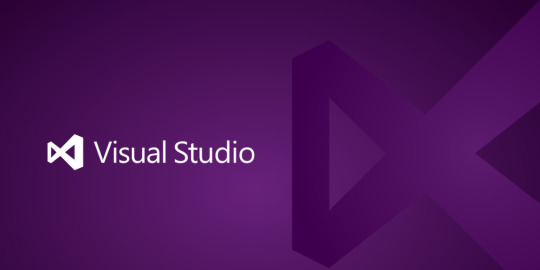
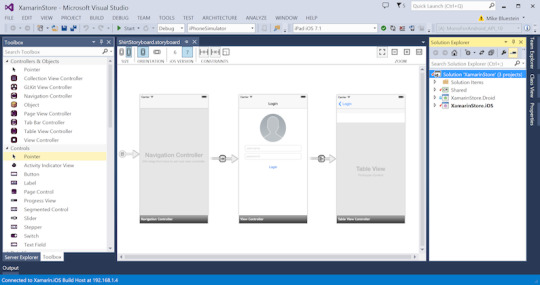
Visual Studio
Visual Studio is a full-featured integrated development environment (IDE) that helps people create other computer programs. It has a lot of different tools that can help with things like writing code, finding mistakes in code, testing programs, and putting the finished program out for other people to use.
Visual Studio can work with different programming languages like C#, VB.NET, F# and C++. It might take some time to learn how to use Visual Studio because it has a lot of features, but once you get the hang of it, you'll be able to create really cool and complex computer programs with it.
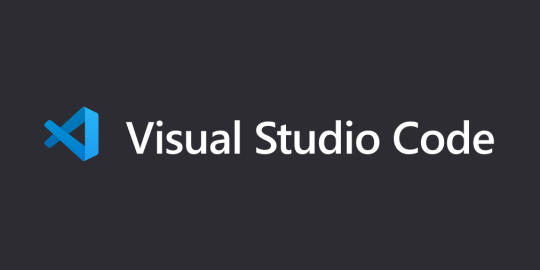

Visual Studio Code
Visual Studio Code is a lightweight, open-source code editor that provides developers with a customizable environment for building and debugging applications. It supports a wide range of programming languages, including JavaScript, TypeScript, Python, and Java.
The interface of VS Code is intuitive and straightforward, making it easy for new users to start working with it quickly. Very beginner-programmer-friendly, in my opinion.

Key Differences
Visual Studio is an IDE
VS Code is a code editor
Visual Studio is primarily designed for building large-scale applications
VS Code is geared towards web development, scripting, and smaller projects
Visual Studio has an extensive range of extensions and add-ons available to expand its capabilities
VS Code has a vast library of free and open-source extensions available in its marketplace, making it a flexible and cost-effective option
Visual Studio Code is known for its lightweight and speedy performance. It consumes fewer resources than Visual Studio, making it an excellent option for developers who are working on lower-end machines

All this info!! Which to pick for my next project?
It depends on what you're making and how big and complicated it is! 🤔
If you're making something really big project, you'll probably want to use Visual Studio because it has a lot of tools to help you. But if you're making something smaller or working on a website, then Visual Studio Code might be better for you.
At the end of the day, it's up to you to decide which one you prefer! 😉👍🏾

That's all and thank you for reading! Hope you learn something new! 💻🙌🏾💗
#xc: programming blog post#resources#codeblr#progblr#studyblr#coding#programming#studying#computer science#comp sci#technology#programmer#coding resources#coding study#tech#visual studio#visual studio code#vscode#code editor#my resources
123 notes
·
View notes
Text
Top 5 Programming Languages to Master in 2025
Programming language theory is the subfield of computer science that studies the design, implementation, analysis, characterization, and classification of programming languages.
1. Java
You might ask, “Is Java obsolete?” Of course not.
Why is Java still popular? Java is one of the oldest and most robust programming languages. It is also an object-oriented language mainly used for Android application development. This is one of the main reasons it is still used today. However, with the advent of programming languages like Kotlin (also suitable for Android development), Java is becoming less popular.
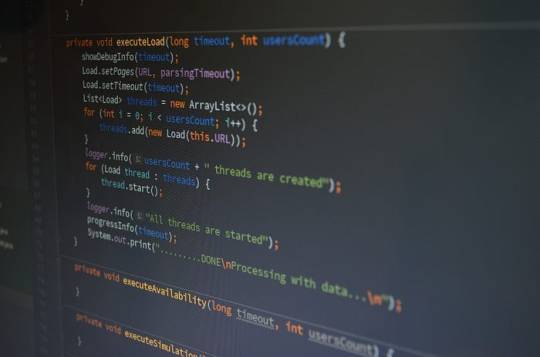
2. Swift

3. SQL
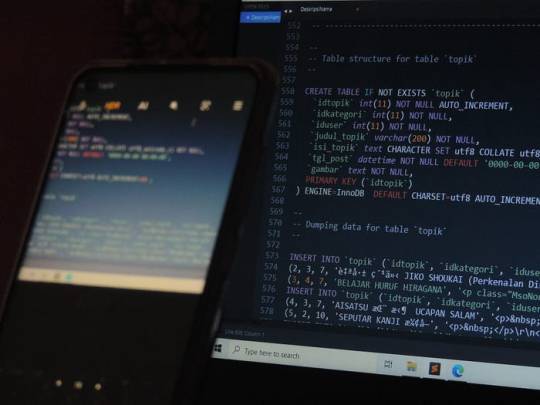
4. JavaScript
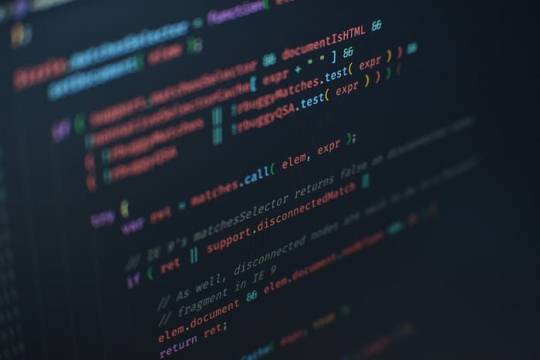
5. Python

The amazing thing about Python is that it’s a general-purpose programming language used to build a wide range of applications. Furthermore, it is active in artificial intelligence. Self-driving cars, Wal-Mart auto-payment, and many automation and machine learning (ML) apps were developed through Python. This makes this language more important and rapidly popularizes. In addition, Python is easier to learn than all other languages and is easy for beginners. You can also build complex applications relatively easily and quickly. In the United States, the average salary for Python developers is about $ 78,000, while experienced developers can be as high as $ 122,000.
2 notes
·
View notes
Text

The Comprehensive Guide to Web Development, Data Management, and More
Introduction
Everything today is technology driven in this digital world. There's a lot happening behind the scenes when you use your favorite apps, go to websites, and do other things with all of those zeroes and ones — or binary data. In this blog, I will be explaining what all these terminologies really means and other basics of web development, data management etc. We will be discussing them in the simplest way so that this becomes easy to understand for beginners or people who are even remotely interested about technology. JOIN US
What is Web Development?
Web development refers to the work and process of developing a website or web application that can run in a web browser. From laying out individual web page designs before we ever start coding, to how the layout will be implemented through HTML/CSS. There are two major fields of web development — front-end and back-end.
Front-End Development
Front-end development, also known as client-side development, is the part of web development that deals with what users see and interact with on their screens. It involves using languages like HTML, CSS, and JavaScript to create the visual elements of a website, such as buttons, forms, and images. JOIN US
HTML (HyperText Markup Language):
HTML is the foundation of all website, it helps one to organize their content on web platform. It provides the default style to basic elements such as headings, paragraphs and links.
CSS (Cascading Style Sheets):
styles and formats HTML elements. It makes an attractive and user-friendly look of webpage as it controls the colors, fonts, layout.
JavaScript :
A language for adding interactivity to a website Users interact with items, like clicking a button to send in a form or viewing images within the slideshow. JOIN US
Back-End Development
The difference while front-end development is all about what the user sees, back end involves everything that happens behind. The back-end consists of a server, database and application logic that runs on the web.
Server:
A server is a computer that holds website files and provides them to the user browser when they request it. Server-Side: These are populated by back-end developers who build and maintain servers using languages like Python, PHP or Ruby.
Database:
The place where a website keeps its data, from user details to content and settings The database is maintained with services like MySQL, PostgreSQL, or MongoDB. JOIN US
Application Logic —
the code that links front-end and back-end It takes user input, gets data from the database and returns right informations to front-end area.

Why Proper Data Management is Absolutely Critical
Data management — Besides web development this is the most important a part of our Digital World. What Is Data Management? It includes practices, policies and procedures that are used to collect store secure data in controlled way.
Data Storage –
data after being collected needs to be stored securely such data can be stored in relational databases or cloud storage solutions. The most important aspect here is that the data should never be accessed by an unauthorized source or breached. JOIN US
Data processing:
Right from storing the data, with Big Data you further move on to process it in order to make sense out of hordes of raw information. This includes cleansing the data (removing errors or redundancies), finding patterns among it, and producing ideas that could be useful for decision-making.
Data Security:
Another important part of data management is the security of it. It refers to defending data against unauthorized access, breaches or other potential vulnerabilities. You can do this with some basic security methods, mostly encryption and access controls as well as regular auditing of your systems.
Other Critical Tech Landmarks
There are a lot of disciplines in the tech world that go beyond web development and data management. Here are a few of them:
Cloud Computing
Leading by example, AWS had established cloud computing as the on-demand delivery of IT resources and applications via web services/Internet over a decade considering all layers to make it easy from servers up to top most layer. This will enable organizations to consume technology resources in the form of pay-as-you-go model without having to purchase, own and feed that infrastructure. JOIN US
Cloud Computing Advantages:
Main advantages are cost savings, scalability, flexibility and disaster recovery. Resources can be scaled based on usage, which means companies only pay for what they are using and have the data backed up in case of an emergency.
Examples of Cloud Services:
Few popular cloud services are Amazon Web Services (AWS), Microsoft Azure, and Google Cloud. These provide a plethora of services that helps to Develop and Manage App, Store Data etc.
Cybersecurity
As the world continues to rely more heavily on digital technologies, cybersecurity has never been a bigger issue. Protecting computer systems, networks and data from cyber attacks is called Cyber security.
Phishing attacks, Malware, Ransomware and Data breaches:
This is common cybersecurity threats. These threats can bear substantial ramifications, from financial damages to reputation harm for any corporation.
Cybersecurity Best Practices:
In order to safeguard against cybersecurity threats, it is necessary to follow best-practices including using strong passwords and two-factor authorization, updating software as required, training employees on security risks.
Artificial Intelligence and Machine Learning
Artificial Intelligence (AI) and Machine Learning (ML) represent the fastest-growing fields of creating systems that learn from data, identifying patterns in them. These are applied to several use-cases like self driving cars, personalization in Netflix.
AI vs ML —
AI is the broader concept of machines being able to carry out tasks in a way we would consider “smart”. Machine learning is a type of Artificial Intelligence (AI) that provides computers with the ability to learn without being explicitly programmed. JOIN US
Applications of Artificial Intelligence and Machine Learning: some common applications include Image recognition, Speech to text, Natural language processing, Predictive analytics Robotics.
Web Development meets Data Management etc.
We need so many things like web development, data management and cloud computing plus cybersecurity etc.. but some of them are most important aspects i.e. AI/ML yet more fascinating is where these fields converge or play off each other.
Web Development and Data Management
Web Development and Data Management goes hand in hand. The large number of websites and web-based applications in the world generate enormous amounts of data — from user interactions, to transaction records. Being able to manage this data is key in providing a fantastic user experience and enabling you to make decisions based on the right kind of information.
E.g. E-commerce Website, products data need to be saved on server also customers data should save in a database loosely coupled with orders and payments. This data is necessary for customization of the shopping experience as well as inventory management and fraud prevention.
Cloud Computing and Web Development
The development of the web has been revolutionized by cloud computing which gives developers a way to allocate, deploy and scale applications more or less without service friction. Developers now can host applications and data in cloud services instead of investing for physical servers.
E.g. A start-up company can use cloud services to roll out the web application globally in order for all users worldwide could browse it without waiting due unavailability of geolocation prohibited access.
The Future of Cybersecurity and Data Management
Which makes Cybersecurity a very important part of the Data management. The more data collected and stored by an organization, the greater a target it becomes for cyber threats. It is important to secure this data using robust cybersecurity measures, so that sensitive information remains intact and customer trust does not weaken. JOIN US
Ex: A healthcare provider would have to protect patient data in order to be compliant with regulations such as HIPAA (Health Insurance Portability and Accountability Act) that is also responsible for ensuring a degree of confidentiality between a provider and their patients.
Conclusion
Well, in a nutshell web-developer or Data manager etc are some of the integral parts for digital world.
As a Business Owner, Tech Enthusiast or even if you are just planning to make your Career in tech — it is important that you understand these. With the progress of technology never slowing down, these intersections are perhaps only going to come together more strongly and develop into cornerstones that define how we live in a digital world tomorrow.
With the fundamental knowledge of web development, data management, automation and ML you will manage to catch up with digital movements. Whether you have a site to build, ideas data to manage or simply interested in what’s hot these days, skills and knowledge around the above will stand good for changing tech world. JOIN US
#Technology#Web Development#Front-End Development#Back-End Development#HTML#CSS#JavaScript#Data Management#Data Security#Cloud Computing#AWS (Amazon Web Services)#Cybersecurity#Artificial Intelligence (AI)#Machine Learning (ML)#Digital World#Tech Trends#IT Basics#Beginners Guide#Web Development Basics#Tech Enthusiast#Tech Career#america
4 notes
·
View notes
Text
Top Free Python Courses & Tutorials Online Training | NareshIT
Top Free Python Courses & Tutorials Online Training | NareshIT
In today’s tech-driven world, Python has emerged as one of the most versatile and popular programming languages. Whether you're a beginner or an experienced developer, learning Python opens doors to exciting opportunities in web development, data science, machine learning, and much more.
At NareshIT, we understand the importance of providing quality education. That’s why we offer free Python courses and tutorials to help you kick-start or advance your programming career. With expert instructors, hands-on training, and project-based learning, our Python online training ensures that you not only grasp the fundamentals but also gain real-world coding experience.
Why Choose NareshIT for Python Training?
Comprehensive Curriculum: We cover everything from Python basics to advanced concepts such as object-oriented programming, data structures, and frameworks like Django and Flask.
Expert Instructors: Our team of experienced instructors ensures that you receive the best guidance, whether you're learning Python from scratch or brushing up on advanced topics.
Project-Based Learning: Our free tutorials are not just theoretical; they are packed with real-life projects and assignments that make learning engaging and practical.
Flexible Learning: With our online format, you can access Python tutorials and training anytime, anywhere, and learn at your own pace.
Key Features of NareshIT Python Courses
Free Python Basics Tutorials: Get started with our easy-to-follow Python tutorials designed for beginners.
Advanced Python Concepts: Dive deeper into topics like file handling, exception handling, and working with APIs.
Hands-on Practice: Learn through live coding sessions, exercises, and project work.
Certification: Upon completion of the course, earn a certificate that adds value to your resume.
Who Can Benefit from Our Python Courses?
Students looking to gain a solid foundation in programming.
Professionals aiming to switch to a career in tech or data science.
Developers wanting to enhance their Python skills and explore new opportunities.
Enthusiasts who are passionate about learning a new skill.
Start Learning Python for Free
At NareshIT, we are committed to providing accessible education for everyone. That’s why our free Python courses are available online for anyone eager to learn. Whether you want to build your first Python program or become a pro at developing Python applications, we’ve got you covered.
Ready to Dive into Python?
Sign up for our free Python tutorials today and embark on your programming journey with NareshIT. With our structured courses and expert-led training, mastering Python has never been easier. Get started now, and unlock the door to a world of opportunities!
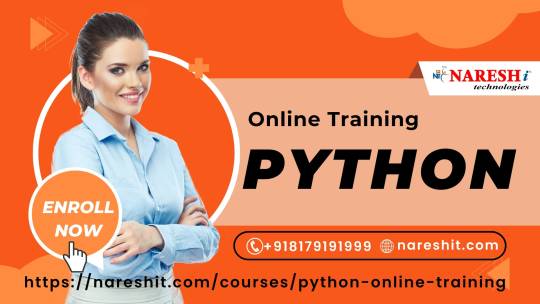
#python#pythontraining#freepythoncourse#onlinetraining#coding#pythontutorials#pythonforbeginners#programming#pythononline#learnpython#softwaretraining#freelearning#pythonprogramming#onlinetutorial#techtraining#pythoncourses#onlineeducation#pythoncode#codingforbeginners
2 notes
·
View notes
Note
Hello! You have cool snakes and know a lot about them too, could I have some of your advice? I've recently been really into snakes, and seen tiktoks of how happy their owners are with them, it makes me really jealous and wishful for a snake companion of my own.
Except I know NOTHING about them, their care, needs or expenses. My experience with pets is a typical low to average maintenance dog, that's it. Never handled reptiles in my life. BUT SNAKES ARE SO ENTICING, and supremely cute too
I was wondering if you have any advice for a complete beginner on what kind of snake to get that's easy and as I said, for beginners (if it even works that way, I don't know a lot about snakes). If you have any resources and such.
Or even like, a checklist to see if I'm even eligible to own a snake (it could be hard idk). Want to know if it is even within my capabilities, the lifestyle needed and stuff like that.
Could you also give tips on their body language? I remember you mentioning in one of your posts that body language is important, and I wouldn't want to mess up. I want the potential cutie to like me after all.
Thank you anyway for your time! Appreciate it <3
so sorry for the late response i wanted to sit down and give a proper thought out guide and just haven't had time <3
checklist for eligibility:
you will need: a terrarium/vivarium, a heating device (heat mat, ceramic emitter or heat bulb), a thermostat (to control the heating device), a water bowl, a hide, substrate, and enrichment (sticks, leaves, decoration etc). make sure you have all of this on hand before you bring your pet home
you'll need to be comfortable or at least willing to feed your snake frozen prey, which means being able to consistently provide mice or rats (most common). most reptile stores will stock frozen!
depending on the species you want you'll need space for a vivarium. if you want a snake that can grow to be 4ft for example you'll need a space to put a 4ft viv.
you'll need to have time to regularly spot-clean their enclosure, which means binning their waste and removing shed skin. a full clean out once a month if not bioactive.
best "starter" snakes (imo):
rosy boa (2-3ft long, 25 years+)
royal python (3-6ft long, 20-30 years+)
corn snake (4-6ft long, 15-20 years+)

rosy boa - these little noodles don't get enough credit! they stay very small, they're very docile, and easy to care for. due to them being so small they only need small prey items which won't take up a lot of space in your freezer. they're very good eaters. downside is they're less common than royals and corns so depending on where you are you may struggle to find one near you. they can also be more food-motivated than royals and when they have food on their mind they can be a little more bitey - but with their tiny size, i promise you can't even feel it (from experience)

royal/ball python - a very common snake that can be found in most reptile shops. they're well known for being extremely docile and easy to handle as well as being super duper cute. they live longer than corns and rosys. downside to royals is they can be "fussy eaters" which can make new owners nervous - they're known for going off their food for months. they will also need larger prey items as they grow, so if you're not keen on keeping larger mice/rats in your freezer this is a downside. they're also more sensitive to improper temperature and humidity than corns.

corn snake - very common so can be bought easily! they also tend to be some of the cheapest snakes, especially if you want to get a "normal/wild type" morph. due to them having a large range in the wild they can tolerate a wider range of temperatures and humidity levels. corns are much more active than royals and rosys, so if you want a snake you can watch do its thing then a corn is a good shout. with this being said, they can be more "squirmy" when being handled compared to royals and rosys as they kind of struggle to stay still.
however, you're not limited to a choice of just three species. as long as you research your snake thoroughly and make sure you have everything you need, you can keep whichever you prefer. my first snake was a brazilian rainbow boa which is a more "intermediate" species and "not suitable for beginners" but he's been great. with their more extreme humidity requirements, i just made sure to keep a hygrometer on hand (to measure humidity) and provided plenty of moss, a large water bowl, and regular mist spraying. never had an issue <3
basic body language:
it's important to note that when a snake is preparing to shed its skin it will be vulnerable. its eyes will cloud over and its skin will feel irritated. we call this being "in blue" because the snake takes on a milky blue colour. during this time your snake might become defensive and this is normal. you should leave a snake in blue alone.
signs of a calm snake: short tongue flicks, loose and relaxed body, moving slowly, fluidly moving towards stimuli, curiosity, regular breathing. a calm snake may sit in an "S" position but it will not be coiling up or fixating on you.
signs of stress in snakes include: long and slow tongue flicks, tail rattling, tail wagging, hissing, striking, open mouth breathing, regurgitation, body flattening, gliding (moving very quickly away), coiling with the head raised (preparing to strike)
this is a very obvious example of a defensive corn snake: their body is coiled into an "S" shape, the head is raised. it takes this position so that it can 1. have a clear view of you 2. to strike upwards/forwards at you if it feels threatened 3. to look bigger to frighten you off. this is a snake who doesn't want to be touched at ALL

let me know if you need anything else <3
7 notes
·
View notes
Text
Why Python is the Best Programming Language for Beginners
Python is one of the most popular programming languages in the world, and for good reason. With its easy-to-learn syntax and powerful capabilities, Python has become the go-to programming language for beginners and experts alike. In this article, we will explore why Python is the best programming language for beginners, and how Native Assignment Help can help you get started with this powerful tool.
Easy-to-Learn Syntax - One of the main reasons that Python is the best programming language for beginners is its easy-to-learn syntax. Unlike other programming languages, Python uses a simple and intuitive syntax that is easy to understand, even for those with no prior programming experience. This makes it an ideal choice for beginners who want to start learning programming without feeling overwhelmed by complex code.
Versatility - Another reason that Python is a great choice for beginners is its versatility. Python can be used for a wide range of applications, including web development, data analysis, artificial intelligence, and more. This means that regardless of what your interests are, Python can be tailored to meet your specific needs.
Large Community and Resources - Python has one of the largest and most active programming communities in the world. This means that there are countless resources available to help you learn Python, including online courses, forums, and tutorials. Additionally, the large community of Python developers means that there are always new libraries and tools being created, which can help simplify programming tasks and make learning Python even easier.
In-Demand Skill - Python is one of the most in-demand programming languages in the world, with many companies looking for Python developers to help build and maintain their applications. This means that learning Python can be a valuable skill to have, both for personal and professional development.
Interactive Interpreter - Python also has an interactive interpreter, which allows beginners to experiment with code and see the results in real-time. This can be a valuable tool for learning programming, as it allows you to quickly test and modify your code without having to compile it first.
Open-Source and Free - Python is an open-source language, which means that it is freely available for anyone to use and modify. This makes it an ideal choice for beginners who want to learn programming without having to invest a lot of money in software. Additionally, the open-source nature of Python means that there are always new libraries and tools being created, which can help simplify programming tasks and make learning Python even easier.
Native Assignment Help and Python - Native Assignment Help offers a wide range of resources and services to help you learn Python and become a proficient programmer. Their team of experts can help you get started with Python, offering guidance and support every step of the way. They offer online courses, tutorials, and forums where you can interact with other Python learners and get feedback on your code.
Conclusion
In conclusion, Python assignment help for beginners because of its easy-to-learn syntax, versatility, large community and resources, in-demand skill, interactive interpreter, and open-source nature. With Native Assignment Help, learning Python has never been easier or more accessible. Whether you are just starting out or looking to take your programming skills to the next level, Python is a powerful tool that can help you achieve your goals.
15 notes
·
View notes
Text
free digital marketing courses , web development tutorials free , accounts courses online free
Institute Unleash your potential with ADC's free digital marketing courses, web development training, and online accounting courses
Are you ready to improve your knowledge and skills? MR Institute ASDC is your best choice! We're committed to giving people the tools they need to succeed in the digital age with our comprehensive range of free digital marketing courses, web training, and online courses.
As MR Institute ASDC, we understand the importance of staying ahead of others in today's competitive environment. That's why we're making our best courses free to make them accessible to all students who need them. Whether you're a professional looking to improve your skills or a beginner looking to break into the world of digital marketing, web development, or finance, our courses support all skill levels.
Key Features of Our Free Courses:
Digital Marketing Courses: From SEO and social media marketing to email marketing and Good content, our digital marketing courses cover everything in the digital space. Many topics are essential for success. Learn how to use multiple digital channels to engage your audience and turn a profit.
Web Development Training: Learn more about the basics of web development with our comprehensive training. Whether you're interested in front-end development with HTML, CSS, and JavaScript, or want to explore the ins and outs of back-end development with languages like Python or PHP, our guides offer step-by-step advice to help you. You. Improve your skills from the source.
Online Accounting Courses: Gain a deeper understanding of accounting concepts and practices with our free online courses. From basic writing to effective financial analysis, our courses provide the knowledge and skills you need to effectively manage your finances, whether in a professional setting or for personal use.
Why choose MR Institute ASDC?
< br>Expert teaching: Our courses are designed and taught by industry experts with many years of experience in their fields, ensuring you receive the best training possible.
Interactive Learning: Participating in interactive activities, quizzes, and events deepens your understanding of key concepts and allows you to apply new skills in the real world.
Simple and easy: With 24/7 access to study materials, you can study at your own pace and in your own time, allowing you to balance your studies with other commitments.
Certificate: When you complete our courses, you will receive a certificate of completion that proves your new skills and enhances your employer sales credentials.
Don't miss this opportunity to invest in your future. Whether you're looking to advance your career, start a new business, or simply expand your horizons, MR Institute ASDC can support you on your journey to success. Sign up online now for our free digital marketing courses, web development courses, and account lessons, and take the first step toward unlocking your full potential!
2 notes
·
View notes
Text
Python Development Course: Empowering the Future with Softs Solution Service

Python, a high-level programming language, has emerged as a favorite among developers worldwide due to its emphasis on readability and efficiency. Originating in the late 1980s, Python was conceived by Guido van Rossum as a successor to the ABC language. Its design philosophy, encapsulated by the phrase "Beautiful is better than ugly", reflects a commitment to aesthetic code and functionality.
What sets Python apart is its versatile nature. It supports multiple programming paradigms, including procedural, object-oriented, and functional programming. This flexibility allows developers to use Python for a wide range of applications, from web development and software engineering to scientific computing and artificial intelligence.
Python’s standard library is another of its strengths, offering a rich set of modules and tools that enable developers to perform various tasks without the need for additional installations. This extensive library, combined with Python’s straightforward syntax, makes it an excellent language for rapid application development.
One of Python's most significant contributions to the tech world is its role in data science and machine learning. Its easy-to-learn syntax and powerful libraries, like NumPy, Pandas, and Matplotlib, make it an ideal language for data analysis and visualization. Furthermore, frameworks like TensorFlow and PyTorch have solidified Python's position in the development of machine learning models.
Education in Python programming has become crucial due to its growing demand in the industry. Recognizing this, institutions like Softs Solution Service, IT training institute in Ahmedabad, have stepped up to provide comprehensive Python Development Training. Their Online Python Development Course is tailored to meet the needs of both beginners and seasoned programmers. This course offers an in-depth exploration of Python's capabilities, covering everything from basic syntax to advanced programming concepts.
The course structure usually begins with an introduction to Python's basic syntax and programming concepts. It then progressively moves into more complex topics, such as data structures, file operations, error and exception handling, and object-oriented programming principles. Participants also get to work on real-life projects, which is vital for understanding how Python can be applied in practical scenarios.
A significant advantage of online courses like the one offered by Softs Solution Service is their accessibility. Students can learn at their own pace, with access to a wealth of resources and support from experienced instructors. Additionally, these courses often provide community support, where learners can interact with peers, share knowledge, and collaborate on projects.
Python's future seems bright as it continues to evolve with new features and enhancements. Its growing popularity in various fields, including web development, data analytics, artificial intelligence, and scientific research, ensures that Python developers will remain in high demand.
In summary, Python is not just a programming language; it's a tool that opens a world of possibilities for developers, data scientists, and tech enthusiasts. With resources like the Online Python Development Course from Softs Solution Service, mastering Python has become more accessible than ever, promising exciting opportunities in the ever-evolving world of technology.
#IT Training and Internship#Softs Solution Service#IT Training Institute in Ahmedabad#Online Python Development Course#Python Development Training#Python Development Course
3 notes
·
View notes
Note
Oh my 🤣🤣🤣
It's not that I'm into coding, it's because I'm an IT student (my choice as a clueless new SSH grad from two years ago everyone 😂) so it's pretty much required if I want to pass this semester 😅.
Though it's really fun, who would've thought that I would by crying when the system that you're making finally does its job as you envisioned it to run? Certainly not me 😂
But if you want to learn, I'd pretty much recommend you to learn Python or JAVA if you want (C++ and JAVA are my personal faves while COBOL and JavaScript are my Kryptonite 💀 but anyway).
Python is an easy enough language to understand due to it's English syntax compared to other languages (COBOL is similar but we're not talking about that, it's more similar to writing an essay than writing a code with that demonspawn 💀) and it's very beginner friendly 😊
JAVA however shares a lot of similar syntax with the other C languages which may help you master those languages easily if you ever decide to broaden your knowledge with countless of other computer languages that there are. Not to mention it's very well-structured compared to Python (yeah, my bias is showing and I don't care 😝).
Happy learning 🤗💜
Honestly, this is what I read: blah blah blah blah, it's my favourite, blah blah blah blah, you should try this blah blah blah ajajajaajajajajaj although I do know the name JAVA ajajajaj but it made me even more curious. I'm saving all those names and I promise to give it a try. I want to give it a try.
4 notes
·
View notes
Text
Exploring Python - A Perfect Easy Language Choice for Beginners
Python is a popular programming language, and it's particularly known for being easy to grasp. But why is Python a common recommendation, especially for people who are new to programming?
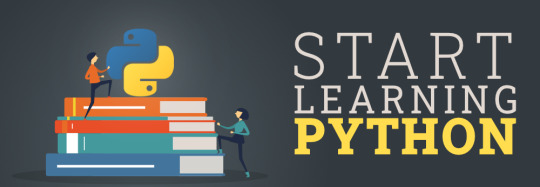
1. Language That Reads Like English:
Python stands out because when you read Python code, it looks a lot like the English language. It doesn't use complex symbols or strange commands. Instead, Python uses words and phrases that you're already familiar with.
2. Emphasis on Easy Reading:
Python places a strong emphasis on making code easy to read. This means that not only is your code easy for you to understand, but it's also simple for others who might work on your code. This focus on readability is like having a friendly guide that helps everyone who deals with the code.
3. Plenty of Learning Help:
Starting something new can often be intimidating, but Python makes the learning process more accessible. There's a wealth of resources available to help you learn Python. These resources include official documentation, tutorials, online courses, and forums. It's like having guidebooks, teachers, and fellow learners who are ready to assist you. Python's vast learning support network ensures you're never alone on your learning journey.
4. Super Flexible:
Python is an incredibly versatile programming language used in various domains. It's employed in web development, data analysis, artificial intelligence, and more. Learning Python opens doors to a wide range of career opportunities, just like a master key unlocks many doors.
5. A Library of Shortcuts:
Python boasts an extensive standard library that includes pre-written code for various common tasks. This is like having a collection of shortcuts to simplify everyday coding tasks. These pre-written pieces of code can save you a great deal of time and effort when you're building applications.
6. A Crowd of Friends:
Python has a vast and active community of developers. These Python enthusiasts hang out online, answering questions, sharing tips, and making sure you're never stranded for too long when you encounter programming challenges. It's like being part of a giant, friendly classroom where help is always at hand.
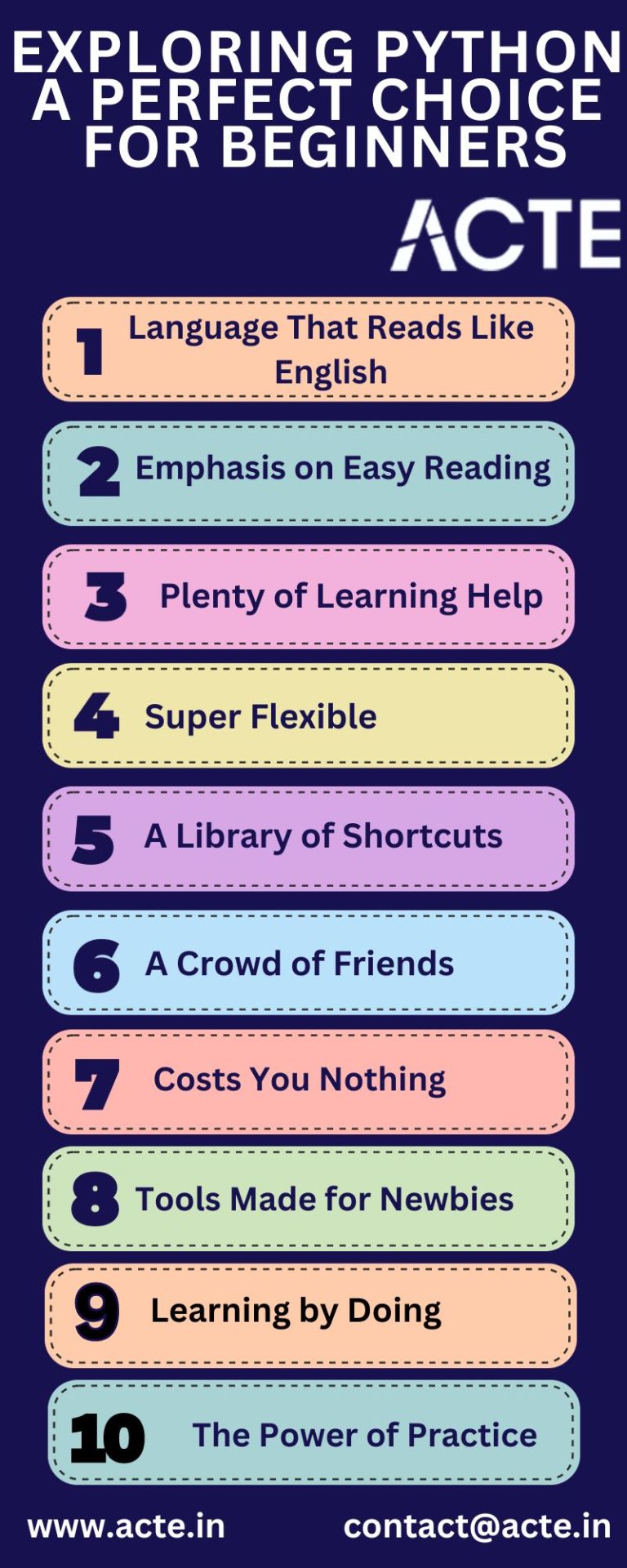
7. Costs You Nothing:
Learning Python doesn't come with a price tag. Python is open-source, which means it's entirely free to use. You can download and install Python on your computer without spending any money, similar to finding a cool toy without having to make a purchase.
8. Tools Made for Newbies:
Python also offers beginner-friendly integrated development environments (IDEs) like IDLE and user-friendly code editors like Visual Studio Code. These tools are designed to make the coding process simpler and less intimidating for beginners, much like having training wheels on your first bicycle.
9. Learning by Doing:
Python strongly encourages hands-on learning. It's similar to learning to cook by actually cooking. With Python, you can start writing and executing code right away, gaining practical experience that accelerates your progress.
10. The Power of Practice:
While Python's simplicity is a significant advantage for beginners, mastering any programming language still requires practice. It's comparable to learning to play a musical instrument. You might hit a few wrong notes at first, but with practice, you'll play beautiful music.
In summary, Python is not tough to learn, especially for beginners. Its user-friendly syntax, readability, extensive resources, and supportive community make it an excellent choice for those starting their programming journey. Remember, with dedication and practice, you can master Python and open doors to a world of coding possibilities.
If you're eager to start your Python learning journey, consider exploring the Python courses and certifications offered by ACTE Technologies. Their expert instructors and comprehensive curriculum can provide you with the guidance and knowledge you need to become proficient in Python.
2 notes
·
View notes
Text
The Best Programming Languages For Beginners
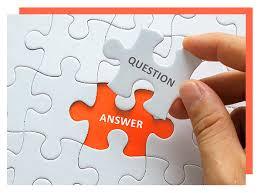
When choosing the right programming language, it’s essential to consider your goals and career. You want to make sure that you choose a programming language that is both in demand and easy to learn. Python is an ideal choice for beginners because it reads like English and has a simplified syntax. It’s also versatile and can be used for anything from web development to software development.
Python
Python is a popular general-purpose programming language that’s easy to learn for beginners and widely used in web development, machine learning, art, automation, and more. It also has a vast community of resources that are available to new programmers.
Java is another widely used programming language, especially for mobile app development. It’s used at companies of all sizes (including HubSpot!) and is one of the easiest to learn if you want to develop for a variety of platforms.Better is to click here or visit our official website to know about Programming question answer.
C is an older programming language but still a good choice for beginners because it’s more “machine-level” and gives you the lowest-level control over computer hardware. It’s also the most common base for other languages, like C# and Ruby.
Java
Despite being not as beginner-friendly as Python, Java is a good programming language to start with. It's a general-purpose programming language with a versatile library and free online tutorials.
It's also a cross-platform language, which makes it suitable for mobile and desktop applications. It's the language of choice for Android development and used in a number of enterprise-level software applications.
C is one of the oldest languages and forms the basis for modern languages like Python, Java, and JavaScript. However, it has a low level of abstraction and requires that code is compiled (translated into machine-readable code) before it can be run. This can make it difficult for beginners to understand. Moreover, its syntax can be confusing. But, it's an excellent foundation for more advanced language learning.
Many people are interested in learning programming, but choosing the best language can be intimidating. Luckily, there are plenty of resources to help you get started. You can learn the basics of multiple languages with a coding boot camp, such as the Georgia Tech Coding Boot Camp, which offers a variety of courses including HTML, JavaScript, and jQuery.
Other popular languages include C, which is a general-purpose, compiled language that’s widely used in back-end software applications like web servers. Python is a versatile programming language that’s easy to learn for beginners and can be used in any application. Ruby is a dynamic, object-oriented language that’s commonly implemented using the Rails framework. Its concise syntax and convention-over-configuration approach makes it easier to build and deploy apps.
Perl
Perl is a high-level dynamic general-purpose scripting language. It is popular among system administrators for its text-processing capabilities, specifically its own in-built version of regular expressions. It is also used for web development and GUI programming.
Beginners can start learning the basics of the programming language by following the free online courses offered on Udemy. These courses begin with basic theory and then move on to specific aspects of the language. They include topics such as lists, arrays, and subroutines. They also cover how to handle errors in coding. Perl has a large community of developers, with over 230 local groups, mailing lists and support/discussion websites. It is also open source and supports more than 25,000 extension modules on CPAN. This flexibility makes it an ideal programming language for beginners.
HTML
Computer programming allows us to create the software and applications that make our lives easier, more entertaining, and more efficient. But deciding which language to learn can be a difficult choice for beginners, particularly when there are so many options available.
youtube
Programming languages may seem different on the surface, but they all have similar structures and features. This means that whichever language you choose to learn, you’ll be learning important coding concepts that will be applicable to any other languages you might decide to explore later on.
Before deciding which programming language to learn, it’s important to consider your goals and current skill level. Once you’ve identified your goals, it’s easy to narrow down your options and find the best programming language for beginners.
2 notes
·
View notes